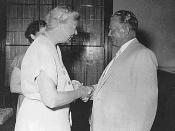The war in Yugoslavia is often compared with images of Nazi Germany and Stalin's pogroms in the Soviet Union by historians. The Yugoslav Civil War began in October of 1991. Global Community worked through the UN, NATO, and the European Community to bring an end to the violence in 1999. However, Kosovo is still being rebuilt; indicted war criminals remain free; many of the provisions of the Dayton Accord are honoured only when external pressure is applied. In this paper I will focus on causes of the Yugoslav civil war that eventually led to the disintegration of the country. Popular and journalistic discussion of the reasons for the collapse of the Yugoslav state, as the professor of Interdisciplinary Human Studies at University of Bradford, John Allcock, argues, have often taken it for granted that its primary cause was the rise of nationalism. The country was destroyed by inner forces welling up from below, having their origins in popular sentiment.
This is conveyed most vividly in the often-used metaphor that President Tito "kept the lid on the boiling pot" of national antagonism (Allcock, 2000:418). Other academics believe that the roots of the problem lay in the Communist system and, in particular, in a crisis proper to its elite. In other words, disintegration was a process driven from the top, not the bottom.
Many scholars search for explanations of certain events in the historical legacy of the country. Therefore it is significant to explore the conditions under which the Yugoslav Civil War of 1991 had emerged.
A state of Yugoslavia was founded in 1918 as the Kingdom of Serbs, Croats, Slovenes, Montenegrins, and others. Over the course of its seventy-year history, writes Sabrina R. Ramet, Yugoslavia lurched from crisis to crisis, abandoning one unstable formula to another. First interwar between the nations...


